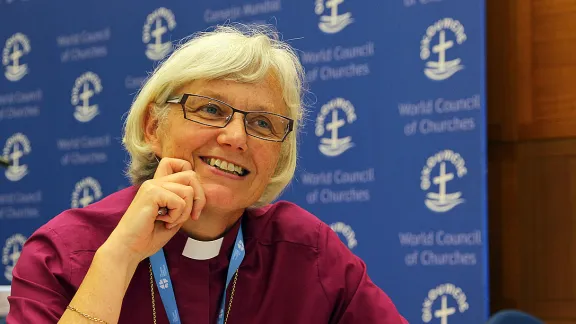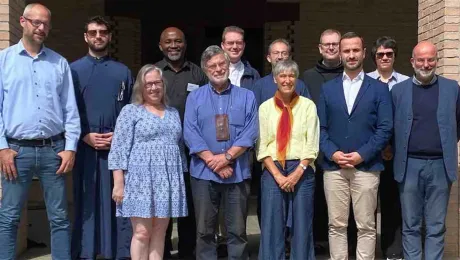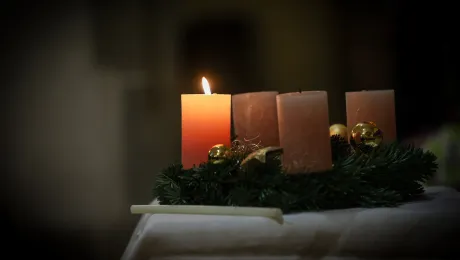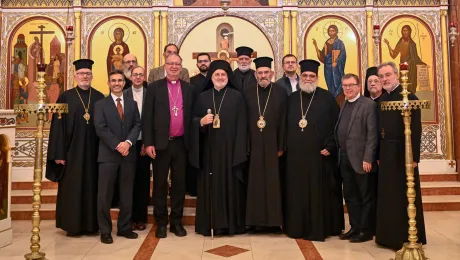
Archbishop Dr Antje Jackelén, Church of Sweden, making a statement during the plenary session of the LWF council meeting on in 2013. Credit: LWF/Maximilian Haas
On May 4, LWF Council member and Swedish Archbishop Dr Antje Jackelén met Pope Francis in the Vatican City. The Archbishop highlighted one of the products of the ongoing Lutheran Catholic dialogue – the publication From Conflict to Communion – a document that has laid the ground for a joint ecumenical event in 2016. Pope Francis was reported by Vatican Radio as saying that From Conflict to Communion may encourage Lutherans and Catholics to take further steps towards full unity of sacramental life and ecclesial ministry. Read the full speech of the Archbishop here:
Your Holiness, Your Eminences and Excellencies
It is an honor and a joy for me to bring you greetings from the Church of Sweden.
Since Vatican II, there have been numerous contacts between the Vatican and the Church of Sweden. Last spring, it was a special honor to host an ecumenical vespers in Lund Cathedral, in memory of the 25th anniversary of the visit of Pope John Paul II to Sweden and other Nordic countries. Also, in my previous capacity as bishop of Lund, I had the pleasure of meeting Rev. Dr. Anders Ruuth, and hear about his experiences from Argentina.
Your Holiness, it was with great joy that I, as a council member of the Lutheran World Federation, witnessed the presentation of the document From Conflict to Communion two years ago – the result of nearly five decades of dialogue between Catholics and Lutherans. For the first time since the 16th century, we now have a shared account of reformation history as well as shared commitments for the future.
With The Joint Declaration on the Doctrine of Justification from 1999 and From Conflict to Communion from 2013, we have reason to highlight some solid ecumenical developments between Catholics and Lutherans. They may not always capture the positive imagination of all experts, but they do inspire the ecumenical hopes and dreams of people at parish level, especially those families longing to go to the Lord’s Table together. We share experiences of mutual condemnation, division and hate, but also of life-giving reconciliation and of lay and grassroots engagements that eagerly anticipate the realities yet to be confirmed by official dialogue.
Koinonia, communion, is ‘learning by doing’ in response to the needs of the world. We have been learning – sometimes the hard way – that it is about sharing the richness of traditions rather than building fences around one’s own turf; that it is about empowerment rather than about power.
It adds to my joy that the Lutheran World Federation and the Catholic Church will jointly host an ecumenical event in the fall of 2016, in anticipation of the 500th Reformation anniversary in 2017. Like our fellow churches in the LWF, the Church of Sweden is dedicated to ecumenical accountability and global perspectives. We are eager to contribute to a commemoration in common thanksgiving for the Gospel and repentance for the pain that conflict and division have caused, as well as in joint commitment to common witness. As the fifth imperative in From Conflict to Communion urges us, “Catholics and Lutherans should witness together to the mercy of God in proclamation and service to the world” (From Conflict to Communion 243).
And indeed, the world is crying out for credible words of hope and for the works of love that the Gospel of Jesus Christ compels us to carry out, together with people of good will from many traditions. In these days, expectations that the Church be an agent of peace and justice are both high and demanding.
Your Holiness has sent waves of hope throughout the world by speaking out on issues of poverty, marginalization and equality – most recently on the scandal of the gulf between wages for men and women. I have been encouraged by people in Sweden to bring Your Holiness a word of gratitude from the LGBTQ community: some of what you have said has evoked a small sense of reconciliation and of dawning acceptance.
Children and women are those who suffer the most from injustice, food and water stress, violence, trafficking and climate change. However, experience proves that women also are those who bring about many of the changes needed, once they are given the rights to education and self-determination. It is necessary not only to speak about and for women, but to speak with them, and to enable their leadership skills to contribute to the flourishing of church and society.
Freedom of religion or belief, social justice, protection of whistleblowers and minorities – the list of challenges for church leaders is long, as it is for the international community. We are grieved and angered by the tragic decline of the Christian presence in the Middle East. The need for humanitarian aid to the victims of wars and catastrophes continues.
Moreover, we are challenged by the spiritual poverty that otherwise well-to-do societies are facing. Secularization leaves us with mixed feelings: on the one hand, it is a result of the success of the Gospel of Jesus Christ, because, when “the world” is challenging us to be braver in affirming human freedom and dignity, it is challenging us with the fruits of our own preaching – which is good. On the other hand, secularization has undermined the knowledge and practice of faith, leaving especially young people without access to the spiritual resources offered by the church. Thus, loneliness, the haunting feeling of never being fully accepted, and the lack of courage to fully face life’s ups and downs are threats to the spiritual health of whole generations.
Insecurity provides a fertile soil for xenophobia and intolerance, a growing problem in Europe. It also keeps us from the urgent necessity to do two things at the same time, such as being involved in interreligious dialogue in order to strengthen social cohesion in diverse cities, while at the same time resisting violence in the name of religion.
The tragedies at the doorsteps of Europe continue. Thousands of people dying in Mare nostrum, our Mediterranean: a shame for Europe! Migration and millions of refugees and IDPs will continue to put our values and our ability to act to the test.
Your coming encyclical on climate will be welcomed by religious leaders, NGOs and decision makers around the world. Climate change probably is the greatest common challenge ever faced by humankind. Now it is time for science, politics, business, culture and religion – everything that is an expression of human dignity – to work together. Climate is about science and faith, about justice and lifestyle, welfare and interdependence, sin and reconciliation, about humans as “created co-creators”, about revisiting anthropocentric world views and about hope. The world looks to religious leaders, since religions provide a cultural integrity, a spiritual depth and a moral force often lacking in purely secular approaches.
A year ago, the bishops of the Church of Sweden published a so-called Bishop’s Letter About the Climate. Last fall, the Church of Sweden completed its divestment process and its financial portfolio is now completely free from fossil fuel companies. We hope many others will follow.
Today’s challenges are no longer defined by local or national borders. They are glocal, both global and local. Borders are no longer what they used to be. That should not scare us. Because at the center of Christianity, there is a God crossing the most dramatic border of all: the one between divine and human. Transgression of borders always entails Berührungsangst, the anxiety of touching and being touched by what is different, strange, other. As people of faith, we can live with these anxieties, remaining centered in the Gospel of the incarnated Christ and open, very much open, to the world. And so, united in prayer for God's creation and the church of Jesus Christ, we say with confidence: Veni Creator Spiritus, Come Creator Spirit.


